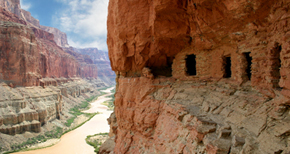"It's Not What You Find, It's What You Find Out."
Learn more about the scientific, ethical, and legal aspects of archaeology. In the words of archaeologist David Hurst Thomas: "it's not what you find, it's what you find out."
Why Study the Past?
To be human is to be curious, questioning, and inquisitive. We know that our ancient ancestors looked to nature with wonder. They experienced fear as the sun disappeared during solar eclipses and joy at its return. They saw cycles of births and deaths, seasons and years, and for all these events they sought explanation and meaning. The search for and discovery of explanations and meaning contributed to the development of human culture. Culture is the shared body of acquired knowledge that humans live by and pass on to each generation. Human curiosity and ingenuity have allowed cultures to evolve and flourish almost everywhere on the earth.
People today understand much more than our ancestors did about natural phenomena. But some old questions remain unanswered while discoveries yield new questions. As long as humans exist, we will seek knowledge and understanding to meet our needs and solve our problems.
Learning about the Past
We learn about the past in many ways. Astronomy now allows us to peer back in time to the birth of our universe 8 billion years ago. Geologists look at the origin and structure of our planet earth 4.5 billion years in the past. Paleontology studies the origin of life on our planet through the fossilized remains of plants and animals. History and archaeology are also fields that study the past. Archaeologists, study the human past—about the last 1-2 million years. Each of these fields has developed its own methods for studying the past.


